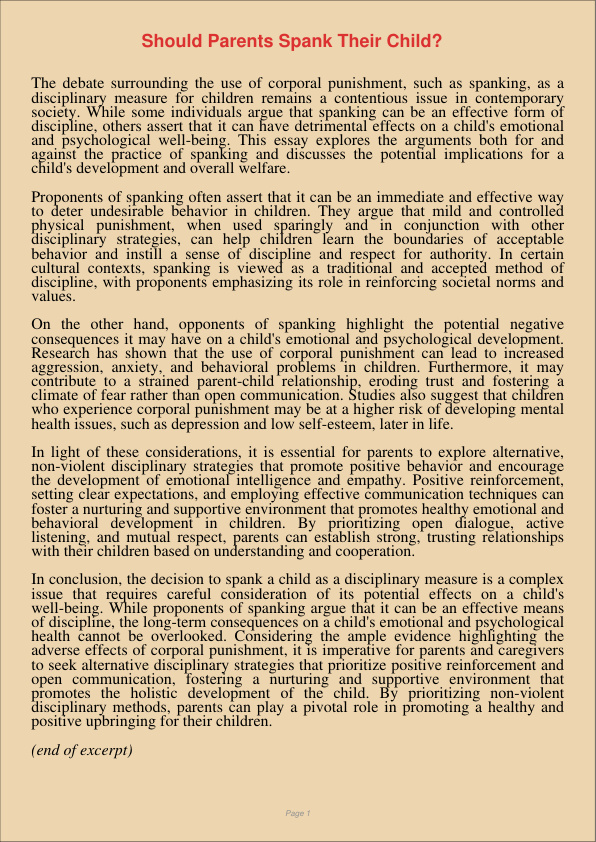Should Parents Spank Their Child
Dec 31, 2023
parents spank
child
Psychology
Information Technology
The debate surrounding the use of corporal punishment, such as spanking, as a disciplinary measure for children remains a contentious issue in contemporary society. While some individuals argue that spanking can be an effective form of discipline, others assert that it can have detrimental effects on a child’s emotional and psychological well-being. This essay explores the arguments both for and against the practice of spanking and discusses the potential implications for a child’s development and overall welfare.
Proponents of spanking often assert that it can be an immediate and effective way to deter undesirable behavior in children. They argue that mild and controlled physical punishment, when used sparingly and in conjunction with other disciplinary strategies, can help children learn the boundaries of acceptable behavior and instill a sense of discipline and respect for authority. In certain cultural contexts, spanking is viewed as a traditional and accepted method of discipline, with proponents emphasizing its role in reinforcing societal norms and values.
On the other hand, opponents of spanking highlight the potential negative consequences it may have on a child’s emotional and psychological development. Research has shown that the use of corporal punishment can lead to increased aggression, anxiety, and behavioral problems in children. Furthermore, it may contribute to a strained parent-child relationship, eroding trust and fostering a climate of fear rather than open communication. Studies also suggest that children who experience corporal punishment may be at a higher risk of developing mental health issues, such as depression and low self-esteem, later in life.
In light of these considerations, it is essential for parents to explore alternative, non-violent disciplinary strategies that promote positive behavior and encourage the development of emotional intelligence and empathy. Positive reinforcement, setting clear expectations, and employing effective communication techniques can foster a nurturing and supportive environment that promotes healthy emotional and behavioral development in children. By prioritizing open dialogue, active listening, and mutual respect, parents can establish strong, trusting relationships with their children based on understanding and cooperation.
In conclusion, the decision to spank a child as a disciplinary measure is a complex issue that requires careful consideration of its potential effects on a child’s well-being. While proponents of spanking argue that it can be an effective means of discipline, the long-term consequences on a child’s emotional and psychological health cannot be overlooked. Considering the ample evidence highlighting the adverse effects of corporal punishment, it is imperative for parents and caregivers to seek alternative disciplinary strategies that prioritize positive reinforcement and open communication, fostering a nurturing and supportive environment that promotes the holistic development of the child. By prioritizing non-violent disciplinary methods, parents can play a pivotal role in promoting a healthy and positive upbringing for their children.
